KAUST supercomputing expertise shines at SC22
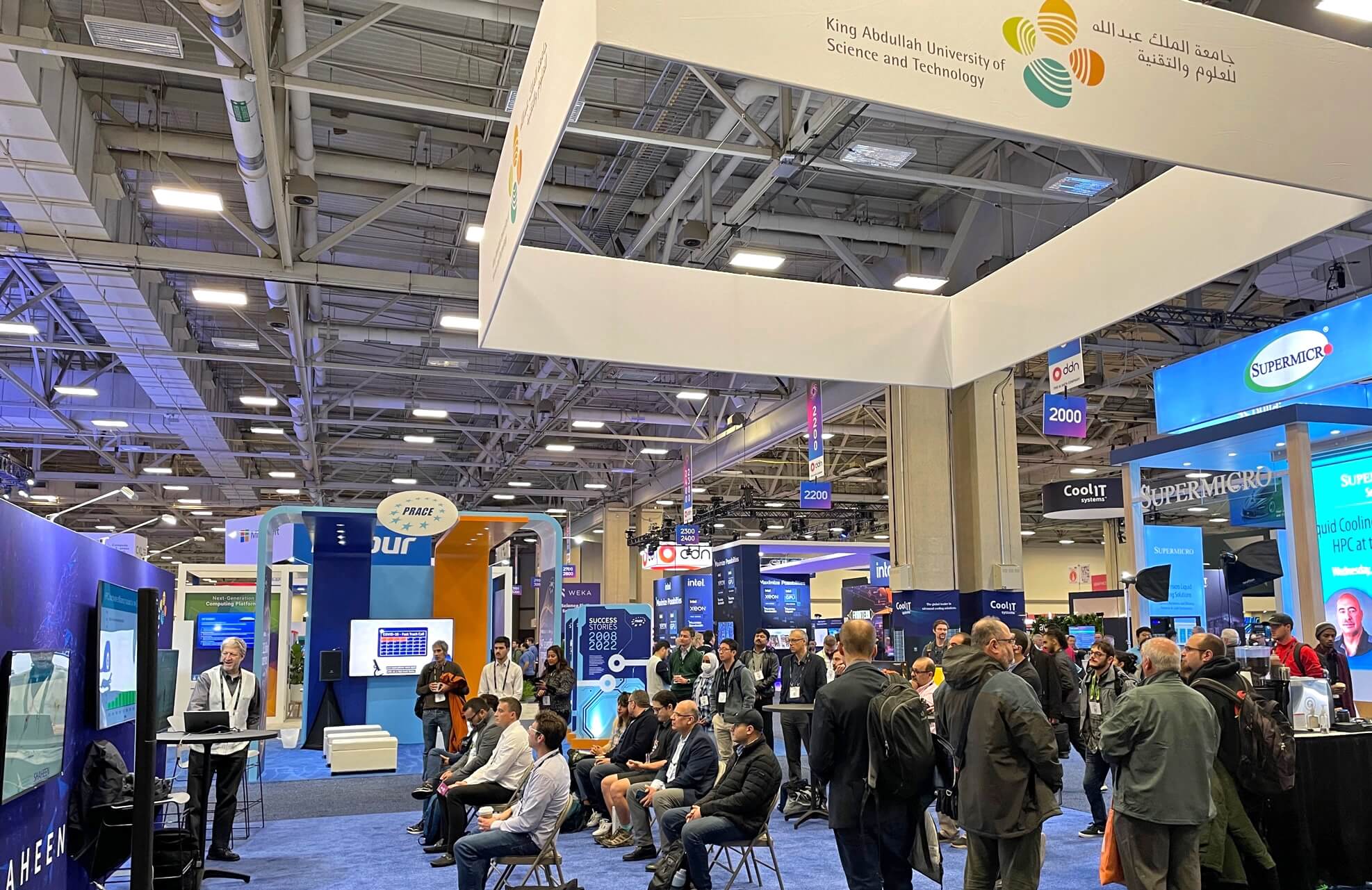
The KAUST booth at the SC22 HPC conference in Dallas, Texas was a lively gathering space for participants to engage with KAUST computational scientists and attend booth talks, panels and other activities. Photo: KAUST
King Abdullah University of Science and Technology (KAUST) found itself at the center of attention among the world's leading experts in high-performance computing at SC22, the annual international conference for high performance computing, networking, storage and analysis, held this year in Dallas, Texas, November 13–18. A contingency of around 20 supercomputing experts from the University attended, with more than 350 organizations participating from around the world.
Sharing the floor alongside academic institutions, governmental bodies and industry vendors, KAUST has been a familiar presence at SC22 since 2008. If the exceptionality of the University's strengths in computational computing had eluded an organization before, then that entity had the opportunity to learn and be impressed at this year's event.
KAUST garnered attention at SC22 for making international headlines in two major areas of distinction within the last few months: 1) Hewlett Packard Enterprise will build KAUST's next-generation supercomputer, Shaheen III, set to be 20 times faster than KAUST's existing system, Shaheen II, and the most powerful supercomputer in the Middle East; and 2) a multidisciplinary team from KAUST was among the finalists selected for the 2022 Gordon Bell Prize, an honor shared with fellow researchers from the
Innovating Computing Laboratory (ICL) at the University of Tennessee in Knoxville. Given by the
Association for Computing Machinery, the award is themost prestigious recognition in the world for outstanding achievement and innovation in the application of high-performance parallel computing to the field of science and technology.
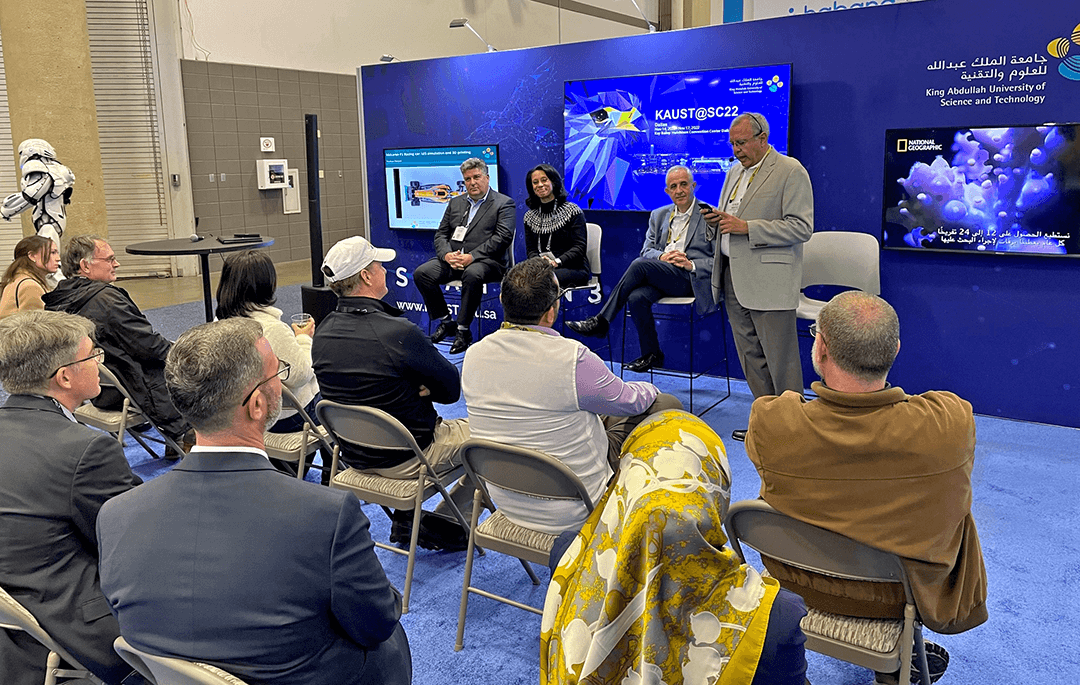
KAUST Professor of Computer Science Dr. Mootaz Elnozahy (standing) moderated a panel, Shaheen III Overview, at the KAUST booth as part of SC22 in Dallas, Texas, with panelists (left to right) Olivier Suinat, Corporate Vice President, Global Commercial Sales at AMD; Shelly Anello, VP, Product Management High Performance Computing at HPE; and John Josephakis, Global VP of Sales and Business Development for HPC/Supercomputing at NVIDIA. Photo: KAUST
In addition to the spotlight resulting from these achievements, KAUST participants and distinguished guests — including
Sidney Fernbach Award winners Bill Gropp and Torsten Hofler — delivered an array of talks, workshops and panels on diverse topics such as node-aware algorithms, tuned approximation and extreme-scale AI models. For the full roster of activities at the KAUST booth, visit the
KAUST SC22 website. KAUST computational scientist
Bilel Hadri served as the SC22
Reproducibility Initiative Chair, whose primary functions are to ensure scientific rigor, transparency and reproducibility of accepted papers. Hadri also presided over this year's Reproducibility Advancement Awards.
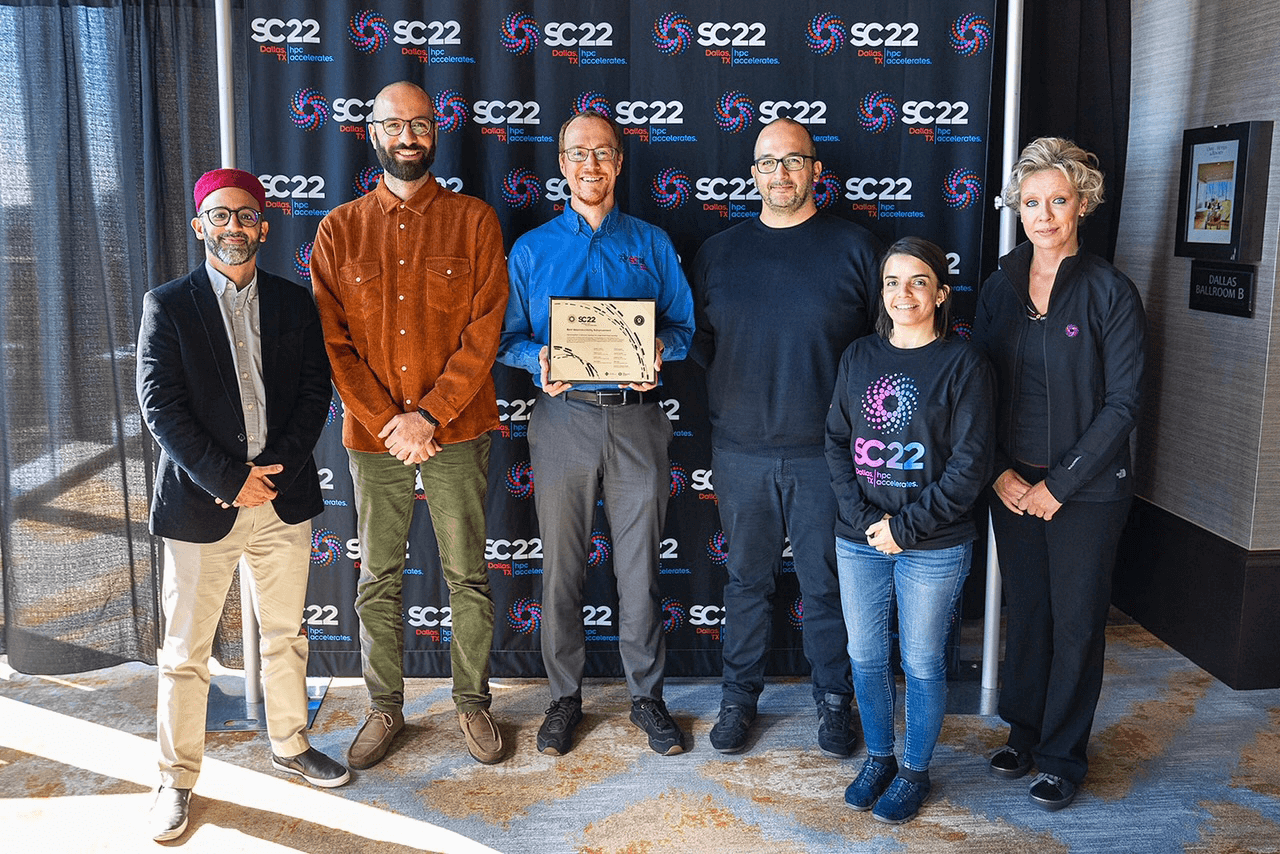
KAUST computational scientist Bilel Hadri (left) served as chair of the Reproducibility Initiative at SC22, Dallas, Texas; shown here with SC22 Reproducibility Advancement Award winner Torsten Hoefler (center), flanked by colleagues from ETH Zürich & Microsoft; Vice Chair Verónica G. Melesse Vergara, Oak Ridge National Laboratory (second to the right); and SC22 Technical Program Vice Chair Heike Jagode, University of Tennessee (far right). Photo: SC22
In commenting on the impact of the KAUST team in-Kingdom, Saudi Assistant Minister for Human Resources and Social Development Mohammed Al-Jasser said, "Sincere thanks to KAUST for all the great efforts aimed at developing the future leaders of the Kingdom of Saudi Arabia (in support of) Saudi Vision2030. (SC22) is a very important event in the industry. Such exposure will help students gain real world perspectives in addition to their academic experience."
Gordon Bell Prize: Competing for a prestigious award
A multidisciplinary team from KAUST and ICL were among five finalists for the 2022 Gordon Bell Prize for building ExaGeoStat, a climate–weather prediction model, powered by one of the world's best supercomputers, Fugaku, at RIKEN in Japan.
Although the KAUST-ICL team did not ultimately claim the winning prize, their finalist status attracted wide interest among the supercomputing community, giving them the opportunity to present their project, Reshaping Geostatistical Modeling and Prediction for Extreme-Scale Environmental Applications, and spread the news about their open-source software to audiences in person and those streaming SC22 from afar.
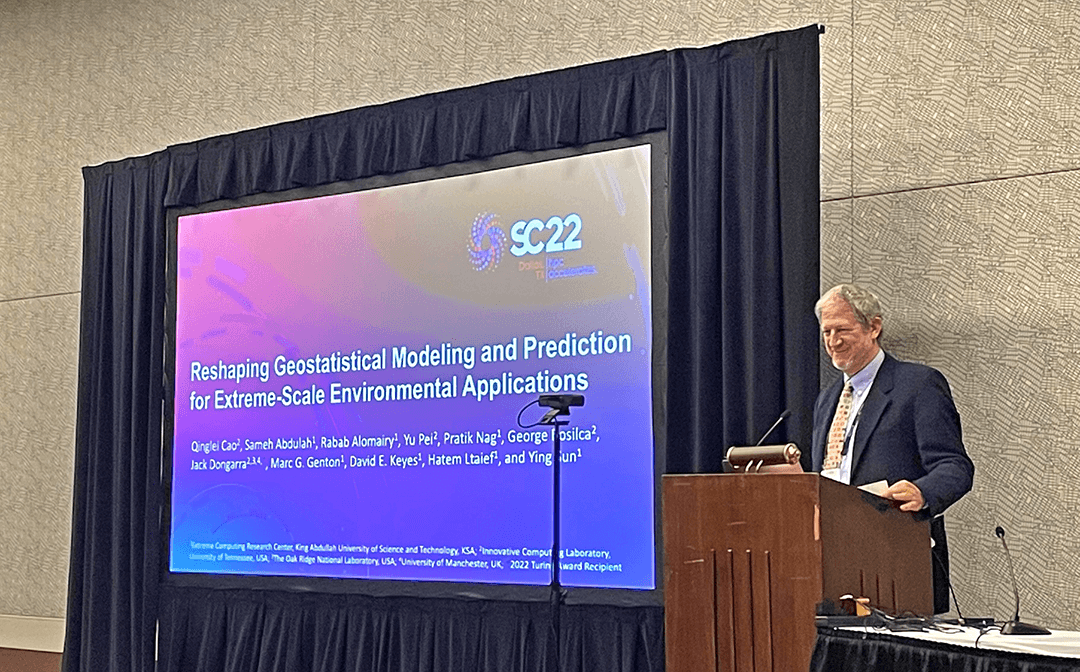
As part of the SC22 Gordon Bell Finalist Award presentations, Director of the KAUST Extreme Computing Research Center (ECRC) David Keyes gives an overview of ExaGeoStat, a climate¬–weather prediction model that was built at KAUST and authored by an 11-member team from both KAUST and the Innovative Computing Laboratory, University of Tennessee. The project was one of five finalists competing for the prize. Photo: KAUST
Led by Director of the KAUST Extreme Computing Research Center (ECRC) David Keyes, professor of applied mathematics and computational science, the KAUST–built ExaGeoStat can process weather data from 10 million locations in 90 minutes, compared with 18 hours for the legacy approach, and can use it to infer such fields as wind, temperature and rainfall at other locations.
In order to gain access to the high-end Fugaku system, the team first tested their method's effectiveness and scalability on other HPC systems, notably the KAUST Supercomputer Laboratory's Shaheen II supercomputer, the High-Performance Computing Center Stuttgart's Hawk supercomputer, and the Oak Ridge National Laboratory's Summit supercomputer.
"The theme of our Gordon Bell entry is computational efficiency through tuned approximation. Statistical methods have traditionally 'over-solved' their inner kernels relative to the accuracy required for desired inferences," explained Keyes. "By detecting and exploiting data sparsity we have shaved orders of magnitude off memory requirements and time-to-solution without sacrificing accuracy. This leads to shorter time to solution for a given problem or the accommodation or larger problems on given resources. Statisticians are interested in both."
This research extends the capability of space-time geostatistical modeling using algebraic approximations, illustrating application-expected accuracy worthy of double precision from majority low-precision computations and low-rank matrix approximations.
"These innovative numerical algorithms are actually a game-changer for many scientific applications in their quests to address exascale computational challenges," said Dr. Hatem Ltaief, ECRC principal research scientist.
Keyes added that solving kernel operations to only the degree of accuracy that the user requires, instead of the default over-solving that is usually done with full rank and full precision will save millions of metric tons of CO2 equivalent emissions when more widely adopted.
This same software combination has wide applicability beyond the 2022 application of climate and weather. For example, the team has already applied aspects of it to seismic imaging, wireless signal decoding, adaptive optics in telescopy, genome-wide association studies and dynamic PDE meshing.
The eleven authors of the interdisciplinary KAUST-ICL team include Jack Dongarra, the former director of the ICL and the most recent winner of the ACM Alan M. Turing Award (asterisks denote KAUST talent): Qinglei Cao, Sameh Abdulah*, Rabab Alomairy*, Yu Pei, Pratik Nag, George Bosilca, Jack Dongarra, Marc Genton*, David Keyes*, Hatem Ltaief*, and *Ying Sun.
Shaheen III: Building the Middle East's most powerful supercomputer
The Shaheen III project was a central talking point in and around the KAUST booth for its projected contributions to Saudi Arabia's innovation output, industry competitiveness and economic growth. The supercomputer will revolutionize KAUST's ability to process vast amounts of data at unprecedented speed and scale, enabling its users to unlock discoveries and realize new potentials for AI to advance research in fields such as food, water, energy and the environment.
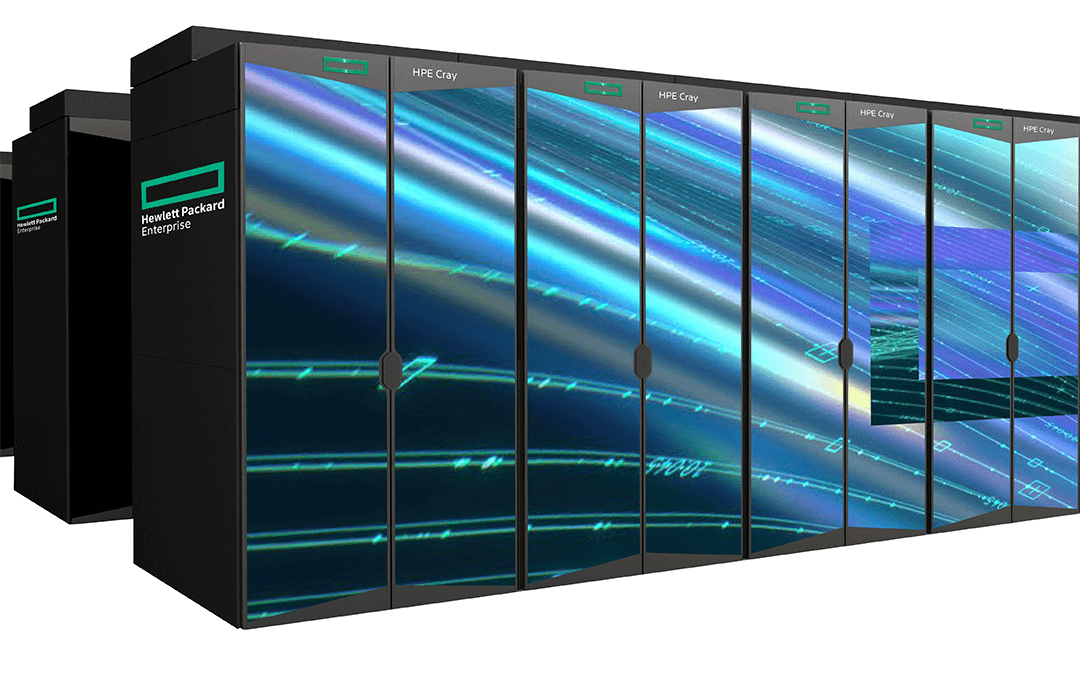
KAUST will host the Middle East's most powerful supercomputer, provided by HPE, the world leader in supercomputing. The new system — "Shaheen III" — will be built using the HPE Cray EX supercomputer, a next-generation platform that will process vast amounts of data at immense speed and scale, enabling users to unlock scientific discoveries across many different research areas. Photo credit: HPE
Built using the HPE Cray EX supercomputer, the machine will deliver advanced end-to-end capabilities in compute and accelerated compute, networking, storage and software solutions, which will allow KAUST to apply significant computational power toward modeling and simulating scientific problems faster and with higher accuracy. The new supercomputer will process unique data sets in focus areas such as clean combustion, Red Sea ecosystems, climate modelling and the Arabian tectonic plate, while delivering analyses, models and simulations at a superior level of resolution.
Dr. Tony F. Chan, President of KAUST, said, "In line with Vision 2030, we strive to meet the ever-increasing demands of our active and solutions-driven faculty, and also those of external partners, for faster and more efficient computing resources. KAUST supercomputing resources are used by more than half of our faculty, students, postdoctoral students and researchers, and researchers from more than 20 external organizations in the Kingdom."
KAUST's users plan to target a range of applications, including the design of new materials for low-cost/high-performing solar photovoltaics; new industrial catalytic processes to increase energy efficiency while reducing waste; personalized preventative health care and the discovery of new medicines; increased hydrocarbon recovery with reduced environmental and economic costs; and the use of genetic, genomic and epigenetic approaches to enhance plants' drought tolerance and resiliency in desert environments.
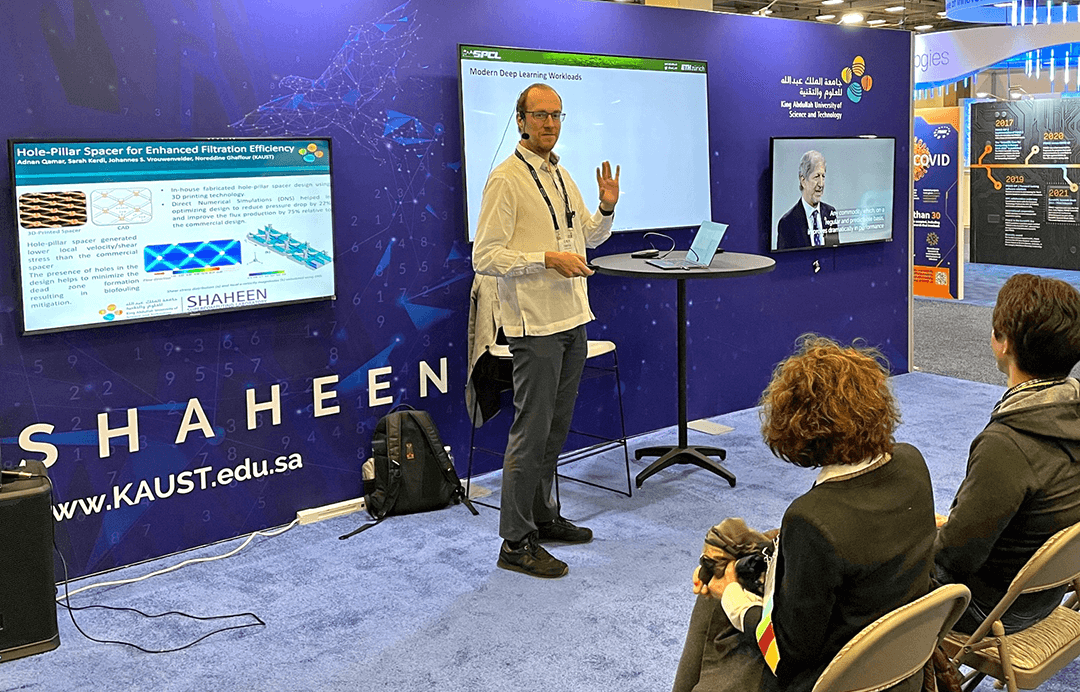
Computational scientist Torsten Hoefler of ETH Zürich & Microsoft, winner of the SC22 Best Paper Award, was among the distinguished guests who gave presentations at the KAUST booth at SC22 in Dallas, Texas. Photo: KAUST
"Shaheen III will ensure that the KAUST community will maintain its edge as a world-class university in computational sciences," said KAUST Research Computing Core Labs Director Dr. Jysoo Lee.
Shaheen III is slated to be fully operational in 2023.
Looking ahead to SC23
As the dust settles on a packed week in Dallas, KAUST is already looking forward to its participation at the next iteration of the event, with SC23 set to take place in Denver, Colorado in November 2023.
Once again, leading scientists, engineers, researchers, educators, programmers, system administrators and developers will gather under one roof to discuss and showcase the latest innovations in the world of supercomputing.
By this time, Shaheen III should be fully operational and processing unique datasets in important KAUST focus areas such as clean combustion, Red Sea ecosystems, climate modelling and the Arabian tectonic plate.

